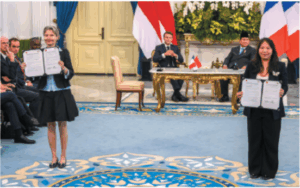Across Asia-Pacific, more than 350 million people have limited access to electricity, while 150 million have none at all. Southeast Asia’s (SEA) power needs will more than double by 2050 compared to 2022, while global electricity use from data centers is expected to exceed twice the current levels by 2030.
The convergence of electrification, industrialization and digitalization means Asia faces a potential energy crisis: how to expand access while simultaneously decarbonizing. The region cannot meet this challenge through government action alone. While the private sector has both the capital and the capacity to accelerate solutions, it must work hand-in-hand with policymakers.
Anderson Tanoto, Managing Director at RGE, with global operations in the bio-based resources and energy sectors, explains: “No single country, company or institution can deliver the energy transition on its own. The private sector brings innovation, capital and speed; governments provide vision and enabling frameworks. Together, we can build an energy system that is sustainable, inclusive and built to last.”

Partnerships That Scale Impact
Energy transition requires collaboration that crosses industries and borders. RGE’s joint venture with TotalEnergies, Singa Renewables, shows what is possible. Supported by the governments of Indonesia and Singapore, the partnership is developing a utility-scale solar and battery energy storage system in Riau, Indonesia.
When operational, the project will supply green electricity to both Indonesia and Singapore while stimulating investments, creating skilled jobs and strengthening regional energy security. The collaboration marries RGE’s deep local roots with TotalEnergies’ global expertise in utility-scale renewables.
Singapore’s Energy Market Authority has already granted Singa Renewables a conditional license for up to 1 gigawatt (GW) of solar energy from Indonesia, a step aligned with Singapore’s target of 6 GW of low-carbon imports by 2035. Building on this, RGE and TotalEnergies signed an agreement with Singapore Energy Interconnections to co-develop a subsea interconnector, a vital step toward the ASEAN Power Grid, which aims to strengthen cross-border electricity trade and accelerate an equitable transition.

Innovation Beyond Electricity
The transition extends beyond power generation. RGE is advancing a waste-to-value strategy by transforming waste and residues from its agribusiness Apical’s global supply chain into sustainable aviation fuel (SAF). Through Apical, it has partnered with Spain’s Moeve to build Southern Europe’s largest SAF plant. Scheduled to be operational in 2026, the facility will produce 500,000 tonnes of SAF annually, reducing carbon emissions by up to 80% compared to conventional jet fuel.
In parallel, RGE is investing in liquefied natural gas (LNG) as a transition fuel. Together with Canada’s Enbridge Inc., it is developing Woodfibre LNG, the world’s first net zero LNG export facility, in British Columbia.
Tanoto notes: “The toughest sectors to decarbonize demand innovation and collaboration on multiple fronts—and the private sector can scale and share expertise across regions.”
Unlocking SEA’s Renewable Potential
The International Renewable Energy Agency (IRENA) estimates SEA’s renewable potential to be 40 to 50 times greater than its current electricity generation. But scale requires more than ambition. Derisking large-scale projects is critical to attracting capital and accelerating deployment.
Governments hold the keys by setting clear, consistent policies that endure beyond political cycles, establishing supportive regulations and cross-border agreements, and designing mandates and targeted subsidies to overcome first-mover risks.
Private players, meanwhile, must manage risks within their control: access to land, building enabling infrastructure, proving technical feasibility, and ensuring benefits flow equitably across markets. Shared value is essential for regional buy-in.
From Ambition to Action
Asia’s energy transition is not just an environmental imperative; it is an economic one. Reliable, low-carbon energy underpins growth, competitiveness and social inclusion.
RGE’s experience shows that commercial viability and long-term impact can go hand in hand. With scale, innovation and cross-border collaboration, the private sector can unlock the capital and expertise to complement government leadership.
Says Tanoto: “Energy is the foundation of progress. If Asia can expand access while decarbonizing, we won’t just meet demand. We will define how economies can grow sustainably, inclusively and competitively for generations to come.”
